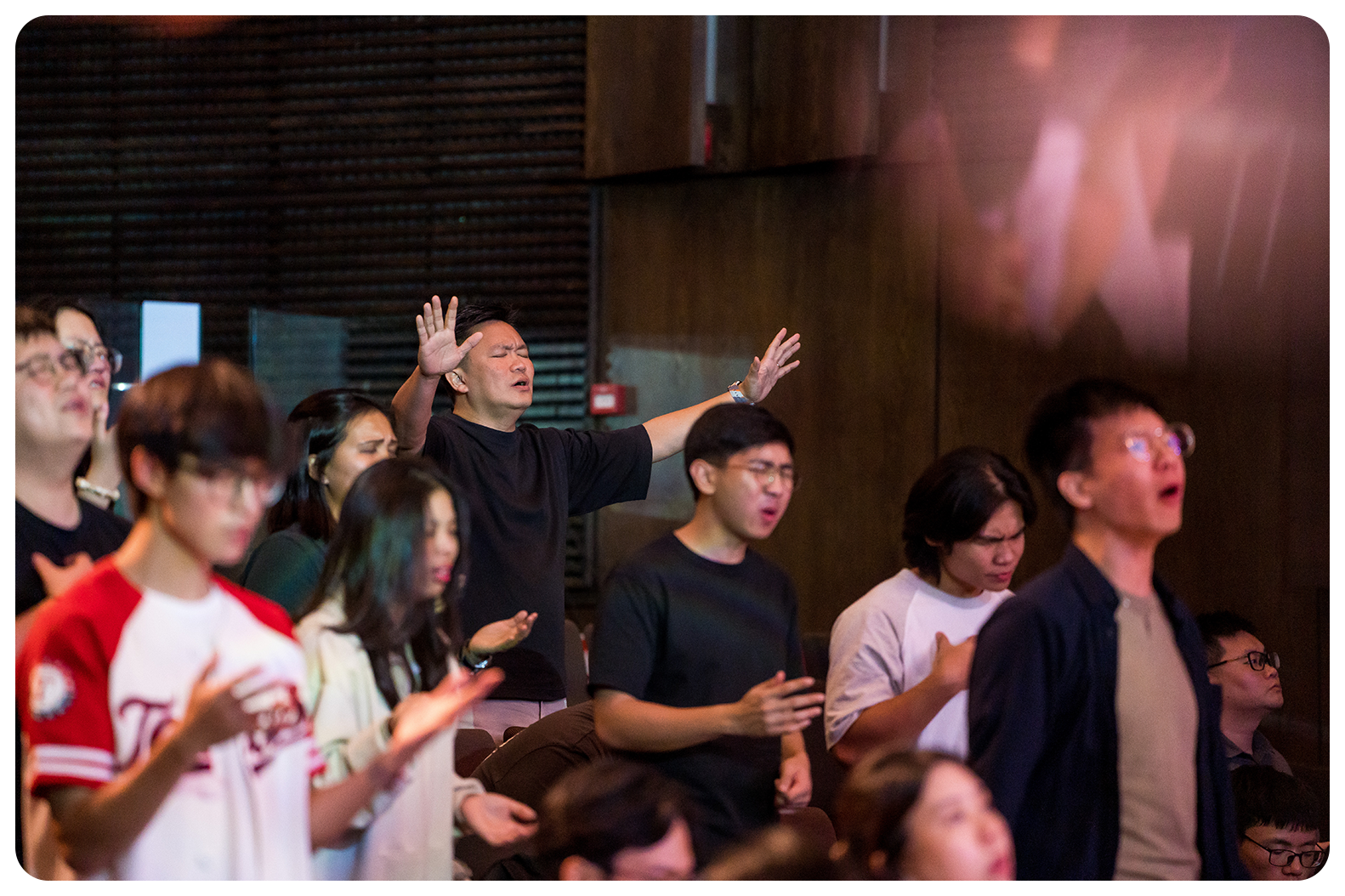Whether you’re a youth pastor, a youth ministry head, a cell leader or in any leadership capacity at all – our minds are constantly thinking how to develop our members.
We tend to ask questions such as, how do we lead? But do we ask, how do we live?
We think about how to advance the kingdom, but do we remember to abide in the King?
We want to move and mobilise our members, but do we forget about how we are to walk by faith?

1. To walk by faith, is to walk in God’s way
Many times, as we serve, we seek to do things the most economical and effective way.
We want to be efficient, gathering as many sheep as we can; churning out more disciples; doing program after program for the sake of evangelism.
But have you heard about the term “efficacy”? How is that different from the efficiency that we’re so used to?
Efficacy means getting things done. It is the ability to produce a desired amount of the desired effect, or success in achieving a given goal. Efficiency is doing things in the most economical way.
Not only that, there are two pictures of efficacy. The first of which, is God’s way of doing things: to do the right thing in the right way, with the right motive to produce the right results.
Which in essence, is to do the will of God.

Have you wondered about how Jesus dismissed the crowds in Matthew 14:22-23, after ministering to and feeding the five thousand people with five loaves and two fishes?
Have we questioned why did He do so? After all, wouldn’t it be better if He continued pressing on, ministering to person after person in the crowd, wouldn’t it be such an opportunity for more evangelism and discipleship?
Here’s the but: it’s a lesson on how we shouldn’t be over-impressed or over-intimidated by numbers. The power is not in the crowd. The power isn’t in the numbers of people that turned up to see him.
Do we think God can’t move if Jesus dismissed the crowd to spend time with God in prayer (which is where the real power lies)?
Which leads us to the second picture of efficacy.
If we want to make an impact for the Kingdom in our community, we have to learn to pray.
The power is in the prayer. It’s in the connection with God. It’s where we hear and discern God’s will.
So give yourselves to prayer. The Word and presence of God will sustain you. It is efficacious.

Also, when we mentor youths, we need to remember that their faith won’t be built by us telling them what to do – it’s built when they are doing it and passing it on.
So first, we cannot neglect capturing their attention, because there are many voices, many distractions, many things that are trying to capture their attention. We need to let them know that there is something better, and that is God.
The second thing is to fire their imagination – to help them see what the Kingdom and the glory and the power of God look like.
The third thing is to redirect their enthusiasm. Redirect their efforts. You don’t have to babysit them. Get them to walk with God and pass on their faith.
The fourth and hardest thing we must do is to build their foundation. There is no greater foundation than the Word of God.
Get them into the Word, because once they are into the Word, the Word of God will inspire their faith. The Word of God will tutor their prayer, and it will engage them in their very lives.
This is how they will be able to rise up and be a disciple-maker as well.

2. To walk by fear, is to walk with a distorted sense of reality
In the same account, Jesus later comes down from the mountain to look for His disciples in the boat that was already at sea.
As He walked on water, we see the disciples freaking out thinking Jesus is a ghost – but that’s where we need a shift of focus!
First, the disciples focused on the rough wind and the waves and they were consumed by fear. Second they focused on the ghost, which made them fearful too. Thirdly, Jesus asked them to focus on Him.
When our focus is anything else other than Jesus, that will breed fear. But when our focus and eyes are on Him, we will have assurance.
So what are we focusing on today? Is the object of our focus our surroundings? Our ministry? Our situations? Our insecurities or failures or regrets — or is it Jesus?
Here’s an analogy where we compare faith to ice: if we’re an ice skater, we would be concerned whether we’re treading on thin ice or thick ice. That would be our focus.
Treading on thin ice definitely brings a sense of fear and uncertainty — it’s dangerous and we might fall in. Fear is real; we would all want to tread on thick ice where there is safety and security.
However, if the object of our faith is Jesus, it doesn’t matter whether we’re stand on thick or thin ice because we’re standing on solid ground.
So consider what our object of focus is. There will be voices of doubt and fear and uncertainty in our walk, but let’s come near to God’s Word where we find solid ground.

3. The Lord invites us to step out in faith, not fear
After the disciples freaked out, Peter said to Jesus: “Lord, if it is you, tell me to come to you.”
But the catch here is that, even before this sentence, Jesus had already identified Himself saying “It is I, do not be afraid.”
Have we ever wondered why Peter had to ask Jesus “If it is you, then tell me to come to you?”
It meant that there was still an ounce of hesitation, an ounce of fear present. But Jesus quelled it by telling Peter to come over to Him.
This time, the ball is in Peter’s court. Peter had to make the choice to step out in faith or stay in the boat.
Likewise, many times we’re put into situations where we as leaders have to step out in faith.
Will we be like Peter and follow God when He tells us to? When we move out in faith, we’ll see God move in faith too.
The future will definitely be uncertain. We can’t predict what tomorrow will bring. Could we have predicted the outbreak of the pandemic? Could we have foreseen other circumstances?
No, but God is our clarity and in Him we can have the conviction to move forth in whatever He called us to do.
Let us not be bound by fear, for bondage is what we call hopeless that God didn’t call hopeless.

In Joshua 10, five kings and their combined armies came together to overthrow the Israelites who had very little military power at that point of time, but Joshua still moved out to face them because God said so.
And as they did, hail fell on the side of their rival armies, and the number of soldiers that died from the hail was more than those who were taken by the sword (Joshua 10:11).
Following the aftermath of the situation in Joshua 11, even more kings in the region got angry and wanted to crush the Israelites by military alliance.
But God said to His people to not be afraid, for He would give them all to the Israelites. So Joshua and his small army, tired out from the recent war, charged ahead to fight — and they were all given the victory.
So leaders, likewise, don’t be immobilised and limited by your own script or your own understanding. Just listen to God and go where He has called you to go, and you will see His victory in action.
4. The greatest trial of faith often comes in the wake of our success rather than failure
The greatest trial in a leader’s walk is not when you’re trying to build a ministry or a church. Yes, it’s tough and you might struggle, but the biggest trial is when you already have a successful ministry.
That’s because it’s easy when success is in your pocket. That’s usually when the focus often shifts, whether it’s to yourself or your surroundings.
Going back to the story of Peter and Jesus walking on the water, if we look at the text carefully, Peter didn’t sink as he was making His way to Jesus. Peter only started sinking after He had arrived at the scene, most probably in front of Jesus.
What we can see here was that when his focus was on Jesus, he was fine and wasn’t sinking. But the moment he reached, his focus probably turned back to himself or the wind and the waves.

Similarly, for us as leaders, whenever we have a successful ministry, our eyes tend to turn to ourselves. So remember never to buy into the celebrity syndrome and let insecurity and competition rear their heads.
Let’s not compare who’s more well known, whose ministry is bigger or who speaks better — all those things come from a root of inferiority and pride.
What’s more important is to look at the bigger picture: in the wake of a dying world, who cares about all these issues?
Actions stemming from inferiority and pride aren’t going to save someone. What we need is to unite and fulfil the Great Commission, to do what God called us to do and keep our focus on God!
Don’t get busy comparing. Don’t let insecurity take focus off God. If we really consider ourselves a servant of God, then let us serve with no strings attached.
Are we serving as servants of God on His terms? Or are we doing so on our own terms, with mixed motives?
5. Jesus is at hand to help us
In verses 31-33, we can see how Jesus stretched out His hand to help Peter after he started sinking.
But if you think about it, Peter was a fishermen and probably wouldn’t be that afraid of sinking. He was definitely a powerful swimmer and could navigate the waters.
So why did he cry out for Jesus to save him? Peter was afraid of missing out. FOMO.

Nonetheless, Jesus, the Son of God — with creation at His command — could have asked two doves to pick Peter out of the water. He could have told the lake to freeze. He could command Peter to fly.
But nope, Jesus stretched out His hand. He chose to dirty His hands to pull us out of the water.
… what is the condition of our own faith?
Indeed, He is the God who came to us from Heaven to Earth. He is the God who stretched out His hand to us to save us from sin.
It is interesting that Jesus said to Peter in verse 31: “O you of little faith”. In fact, the disciple with the biggest faith was probably Peter, because he was the only one who dared to call out to the “ghost” that was Jesus. So why did Jesus say that?
Jesus was perhaps not referring to the size of Peter’s faith, but instead, referring to the object of His faith.
He was probably questioning Peter, why he decided to turn to himself and trust what his eyes saw regarding the stormy surroundings — and thus doubt that the power lies with Jesus.
So, to end off, as leaders, let us consider: what is the condition of our own faith?
This article was adapted from Rev Edmund Chan’s sermon here.
- If fear is “1” and faith is “10”, where would the youths you’re leading be?
- What is one practical thing you can do to shift the needle and step out in faith for yourself?
- What is one practical thing you can do to shift the needle and step out in faith for the ones you’re leading?









